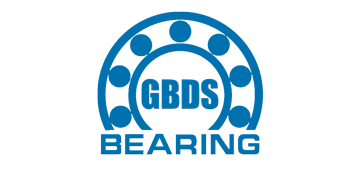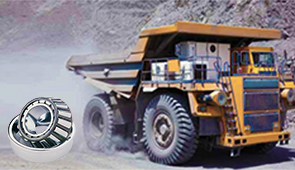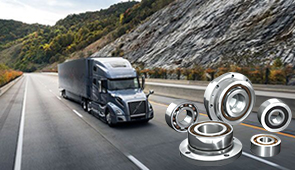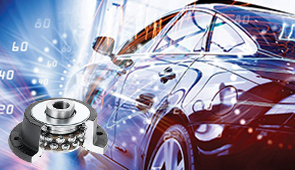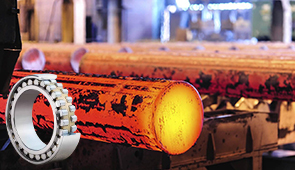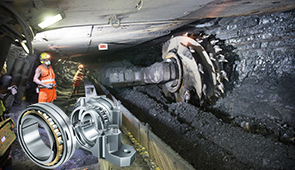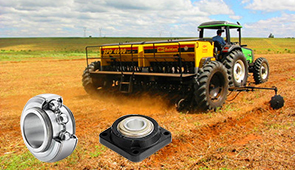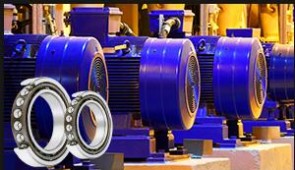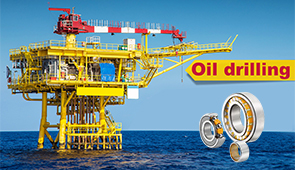Bearing components Symbol
Bearing components Symbol
Criteria for Bearing components Symbol:Bearing Type , Bearing Dimensions , Bearing Tolerances , Bearing Internal Clearance , Other technical details , Dimensional and running accuracy
What are bearing suffixes?
1) leading code
GS——Thrust cylindrical roller, thrust needle roller bearing race. Example: GS81107-the raceway of thrust cylindrical roller bearing 81107.
K——In the combination of thrust roller and cage. Example: K81170.
K -—— In accordance with AFBMA standard series inch tapered roller bearing with inner ring (inner cone) or outer ring (cone ring) with roller and cage assembly.
Example: K-09067-the inner cone of a tapered roller bearing of series 09000.
L——Single inner or outer ring of release bearing. Example: LNU207-the inner ring of cylindrical roller bearing NU207.
L30207——The outer ring of tapered roller bearing 30207.
R——Separate bearing except single inner ring or outer ring. Example: RNU207-cylindrical roller bearing NU207 outer ring with roller and cage assembly.
R30207——Inner ring of tapered roller bearing and cage assembly.
WS——Thrust cylindrical roller, thrust needle roller. Example: WS81107—the shaft washer of thrust cylindrical roller bearing 81107.
2. Post code
If there are several post codes in the bearing code, these post codes are arranged in groups in the following order: (1) internal design, (2) external design, (3) cage,
(4) other features. (1) (2) (3) A half Chinese character space is left between the post code and the basic code in the group;
(2) The post code of the dust cover and the sealing ring in the group are exceptions, Put a hyphen "-" in front of the code; (4) Put a slash in front of the post code in the group. Slashes are also used to isolate the two
(4) post-codes in the following two cases:
a. When the first postcode ends with a number and the second postcode starts with a number. Example: 6205 / P53 / 223316.
B. The post code indicating the range of compression and / or moving clearance is followed by a post code indicating the type of grease. If the slash is omitted, it will cause confusion. Example: 6205-2Z / C2L / HT42 (= C2L + HT42).
(1) Internal design
A, B, C, D, E-When the normal internal structure changes, these post-codes and their combinations generally form part of the bearing series code.
They are usually used only during the transition period, and are omitted after the transition period .
However, when they represent an alternative structure, these postcodes become permanent. Usually their meaning is unique to a certain bearing type or bearing series. E.g:
Single row angular contact ball bearings
ACD-The contact angle is 25 degrees.
B——The contact angle is 40 degrees.
CC——The contact angle is 12 degrees.
CD-The contact angle is 15 degrees.
BE——BE type bearing with a contact angle of 40 degrees, the steel ball is enlarged, and the glass fiber reinforced nylon 6.6 cage is used.
Double-row angular contact ball bearings
A——The standard design of the bearing with an outer diameter of 90 mm or less, no ball gap, using glass fiber reinforced nylon 6.6 cage.
E——There is a ball port on one side of the bearing, which can hold more steel balls, so it has higher radial and axial load carrying capacity.
Spherical roller bearing
CAC, ECAC, CA, ECA-these are designed for large-size bearings, the rollers are symmetrical. Both sides of the inner ring are provided with fixed ribs, and the inner ring is guided by the inner ring during the movement.
The cage is a solid brass or steel solid frame. CAC and ECAC bearing rollers and raceway surfaces are optimized to help guide the rollers and reduce friction. ECAC type has reinforced rollers to increase load capacity.
CC, C, EC-These bearing rollers are symmetrical, and the inner ring has no ribs. Each row of rollers has a stamped steel cage.
The retaining ring in motion is guided by the inner ring. EC bearings use reinforced rollers to increase load capacity.
CC-type bearing rollers and raceway surfaces are optimized to help guide the rollers and reduce friction.
E——SKF company adopts the latest standard design. The bearing rollers are symmetrical. The inner ring has no ribs. The movable ring made of iron bronze is near the outer ring. E-bearings have all the advantages of CC-bearings.
The newly developed cage can be fitted with more and larger diameter extended rollers, making the bearing load capacity higher.
The outer ring of the E-type bearing has an oil groove and three oil holes. W must be added to the rear code to indicate the difference.
Cylindrical Roller Bearings
B——Bearings use surface-treated rollers (full complement roller bearings).
B4——The surface of the bearing ring and the surface of the roller have been treated (full complement roller bearings).
EC——The internal geometry of the bearing is improved, with higher load carrying capacity, the ribs and roller end faces have good contact and lubrication conditions, and can withstand higher axial loads.
(2) External design
CA, CB, CC——Universal paired single-row angular contact ball bearings, which can be installed in pairs (in series, face-to-face or back * back) Back * back or face-to-face arrangement,
the ratio of internal clearance to normal value before axial installation: small (CA), normal (CB), large (CC).
-2F——Spherical ball bearings have dust retaining rings on both sides.
-2FF——Combined dust rejection ring on both sides of the outer spherical ball bearing.
G——Universal paired single row angular contact ball bearings. When face-to-face or back-to-back arrangement, there is a certain preload in the bearing before installation.
GA——face to face, back * back arrangement, the bearing has a lighter preload.
GB——face to face, when the back * back arrangement, there is a medium preload in the bearing.
GC——face to face, back * back arrangement, there is a heavier preload in the bearing.
K——Conical hole, taper 1:12.
K30——Conical hole, taper 1:30.
-LS——The bearing has a contact seal on one side, and the inner ring has no sealing groove.
-2LS——LS seals on both sides of the bearing.
N——Stop groove on bearing outer ring.
NR——The bearing outer ring has a stop groove and a stop ring.
N2——There are two notches on the outer chamfer in diameter.
PP——bearings (supporting roller bearings, cam follower bearings) have contact seals on both sides.
RS-bearing (needle bearing) has a synthetic rubber or polyurethane contact seal on one side.
-RS1——The bearing has a steel-lined synthetic rubber contact seal on one side.
-2RS1——RS1 seal on both sides of the bearing.
-2RS——Bearing (needle bearing) has RS seal on both sides.
-RZ-Low friction seal with steel-lined synthetic rubber on one side of the bearing.
-2RZ-RZ seals on both sides of the bearing.
X——1. The basic dimensions have been modified to meet ISO standards; 2. Cylindrical rolling surfaces (supporting roller bearings, cam follower bearings).
Z——The bearing has a dust cover (non-friction seal) on one side.
-2Z——Dust cover on both sides of the bearing.
-ZN——The bearing has a dust cover on one side and a stop groove on the outer ring on the other side.
-2ZN——Dust cover on both sides of the bearing and stop groove on the outer ring.
-2NR——Same as -ZN, and has a stop ring.
-2ZNR——Same as -2ZN, and with stop ring.
(3) Cage
In order to indicate the guide way of the cage in the bearing, the letter A or B can be added after the rear code of the cage. A indicates that the cage is guided by the outer ring; B indicates that the cage is guided by the inner ring. The unillustrated cage is guided by the rolling elements.
Example: MA——Brass mechanism cage, outer ring guide.
A number can also be added after the rear code of the cage to indicate different designs or materials.
Example: TN9-glass fiber reinforced nylon 6.6 injection molding cage.
F——Steel or special cast iron solid cage.
J——Steel stamping cage.
M——Light alloy solid cage.
MP-brass solid cage.
P-glass fiber nylon 6.6 injection molding cage.
TN——Engineering plastic injection cage.
Y——Copper plate forming cage.
V-full roller bearing (no cage).
VH-full roller bearing (cylindrical roller bearing) composed of non-separable roller assembly.
(3) Other characteristics
1) Tolerance level
/ CLN-equivalent to ISO tolerance class 6X, for metric tapered roller bearings (with reduced width tolerance).
/ CL0——Equivalent to ISO0 tolerance, used for inch tapered roller bearings.
/ CL3——Equivalent to ISO3 tolerance for inch tapered roller bearings.
/ CL7A——Tapered roller bearings that meet the standard for differential bearing arrangements.
/ CL7C——Tapered roller bearings that meet special standards for differential bearing arrangements.
/ P4——The size and rotation accuracy accord with ISO4 level tolerance (precision than P5).
/ P4A——The dimensional accuracy conforms to the ISO4 level tolerance, and the rotation accuracy is equivalent to the AFBMA standard ABEC9 level.
/ P5——The dimensional rotation accuracy conforms to ISO5 tolerance (accuracy is higher than P6).
/ PA9A——The size and rotation accuracy are equivalent to AFBMA standard ABEC9 level.
/ PA9B——The dimensional accuracy is equivalent to AFBMA standard ABEC9 level, and the rotation accuracy is higher than PA9A.
/ SP——The dimensional accuracy is about P5, and the rotation accuracy is about P4.
/ UP——The dimensional accuracy is about P4, and the rotation accuracy is higher than P4.
2) Bearing clearance
/ C1——The clearance is in accordance with the standard set of 1 group, the clearance is less than 2 groups.
/ C2——The clearance is in accordance with the standard 2 groups, the clearance is less than 0 groups.
/ C0——The clearance is in accordance with group 0 of the standard. It is omitted in the code and is not indicated.
/ C3——The clearance is in accordance with the standard 3 groups, the clearance is greater than 0 groups.
/ C4——The clearance is in accordance with the standard 4 groups, the clearance is greater than 3 groups.
/ C5——The clearance is in accordance with the standard 5 groups, the clearance is greater than 4 groups.
When the clearance code is combined with the bearing tolerance grade code P4, P5 or P6, the clearance code C can be omitted.
Example: P6 + C2 = P62
3) Special technical requirements.
/ Q-best internal geometry and surface roughness (for tapered roller bearings).
/ Q66——The vibration level is less than the ordinary level standard, and the vibration peak value is less than the ordinary level standard.
/ QE5——Meets the special standards for motors, and the size and rotation accuracy reach P6. Very low noise.
/ QE6——Compliant with motor standards, low noise.
4) Bearing arrangement.
/ DB——Two pairs of single-row deep groove ball bearings, single-row angular contact ball bearings or single-row tapered roller bearings are installed in pairs back to back The number after DB indicates the axial clearance or the preload during installation.
A——light preload (angular contact ball bearing).
B——The preload is larger than A (angular contact ball bearing).
C——The preload is larger than B (angular contact ball bearing).
CA-small internal clearance (deep groove or angular contact ball bearings).
CB——The internal clearance is larger than CA (deep groove or angular contact ball bearing).
CC——The internal clearance is larger than CB (deep groove ball bearing).
CG —— "zero" clearance (tapered roller bearing).
C ...—— Special axial internal clearance The number after CC indicates the axial clearance.
GA-lighter preload (deep groove ball bearings).
GB——The preload is greater than CA (deep groove ball bearing).
G ...—— Special preload (the number after G indicates the size of the preload).
Example: 6208 / DBGA—Indicates two back * back mounted 6208 deep groove ball bearings with light load.
/ DF——Two matched single row deep groove ball bearings, single row angular contact ball bearings or single row tapered roller bearings arranged face to face. DF can be followed by the same letters as DB.
/ DT——Two matched deep groove ball bearings arranged in series, single-row angular contact ball bearings or single-row tapered roller bearings.
5) Heat treatment. The dimensions of the inner and outer rings of the bearing are stabilized and can be operated at the following temperatures:
/ S0-up to 150 degrees Celsius.
/ S1-up to 200 degrees Celsius.
/ S2-up to 250 degrees Celsius.
/ S3-up to 300 degrees Celsius.
/ S4-up to 350 degrees Celsius.
6) Lubricant replenishment.
/ W——Cannot replenish lubricating oil (no lubricating oil groove and oil hole).
/ W20——The bearing outer ring has three lubrication holes.
/ W33——The outer ring of the bearing has a lubricating oil groove and three oil holes.
/ W33X——The outer ring of the bearing has a lubricating oil groove and six oil holes.
7)
Lubricant. The post code used to identify the type of grease filled in the bearing is composed of a letter group and two numbers, the letter represents the temperature range, and the next two numbers represent the actual grease.
/ HT——High temperature grease (-20 ° C ~ + 130 ° C).
/ LHT——low / high temperature grease (-40 ° C ~ + 140 ° C).
/ LT——Low temperature grease (-50 ° C ~ + 80 ° C).
/ MT——Medium temperature grease (-30 ° C ~ 110 ° C).
MT post code indicates that certain bearings use non-standard grease. When the amount of grease in the bearing is different from the standard filling amount (25% ~ 30% of the free space inside the bearing), it is identified by an additional letter:
A: The amount of grease is less than the standard amount.
B: The amount of grease is greater than the standard amount.
C: The amount of grease is greater than B.
Example: 6210-2Z / HT51B-It means that the 6210 type deep groove ball bearing with two dust covers has a larger amount of grease than the standard filling amount expressed by its post code, which can be used at high temperatures.
8) Other characteristics. The letter V and another letter (such as VA) are combined with three numbers to identify variations of the standard design that cannot be expressed with other existing postfixes. Such as:
/ VA201——Kiln car bearing.
/ VA301—— Cylindrical roller bearing for traction motor.
